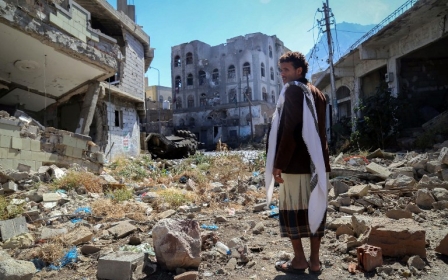War in Yemen: Saudi-led coalition 'used outlawed cluster bombs'

The Saudi-led coalition fighting against Houthi rebels in Yemen used Brazilian-made rockets containing banned munitions in attacks near two schools earlier this month, Human Rights Watch (HRW) said in a statement on Friday.
HRW said that the outlawed cluster bombs were fired in attacks near two schools on 6 December in an offensive in the northern rebel-held province of Saada, claiming the lives of two civilians and injuring at least six, including a child.
“Cluster munitions are prohibited weapons that should never be used under any circumstances due to the harm inflicted on civilians. Brazil should make an immediate commitment to ending production and export of cluster munitions," Steve Goose, HRW arms director and chair of the Cluster Munition Coalition, said in the statement.
HRW called on Saudi Arabia and other coalition members to stop all use of cluster munitions.
Abstentions from ban vote
The Saudi-led attack came a day after Saudi Arabia joined the US and Brazil in abstaining from a UN General Assembly vote that overwhelmingly supported an international ban on cluster bomb use.
Cluster bombs, which are dropped by air or fired by artillery, scatter hundreds of bomblets across a vast area which sometimes fail to explode and are difficult to locate and remove, often killing and mutilating civilians long after the bombs are dropped.
Witnesses interviewed by HRW described hearing a loud explosion followed by several smaller explosions, which landed on water tanks and houses.
“We heard two sounds of explosions, one louder than the other, and after that we heard more explosions, smaller, and falling from the sky like embers," Khaled Rashed, a 38-year-old member of the local council, told HRW.
"It landed everywhere, (on) water tanks over houses, one exploded and destroyed a taxi," Rashed added.
Students were told to take the next day off so the schools could be checked for any explosive remains and undetonated bomblets.
On Monday, the Saudi-led coalition admitted that it had made "limited use" of British-made cluster bombs, a type of weapon which 100 countries have already pledged not to use.
It said it used the BL-755 cluster bombs "against legitimate military targets to defend Saudi towns and villages against continuous attacks" by the Houthis. The rebels have fired rockets into the Saudi side of the border, killing civilians and soldiers.
Children killed
The coalition claimed it deployed the weapons in accordance with international humanitarian law, and not in civilian areas, adding that Saudi Arabia no longer uses the BL-755. However, the coalition did not say that it would stop using other kinds of cluster munitions.
In June, London-based rights group Amnesty International said that "at least 16 civilians – including nine children – have been killed or injured by cluster submunitions" between July 2015 and May of this year.
In August, the Saudi-led alliance was accused of killing 10 children and injuring 28 others during an air strike on a Quran school in Saada province.
Members of the Saudi-led coalition said that they would investigate the allegations in response to calls from the UN.
In March 2015, Saudi led a coalition of Arab and Gulf countries in support of Yemen’s toppled government against Shia Houthi rebels.
Since then the war has killed more than 7,000 people and wounded nearly 37,000, the United Nations says.
Stay informed with MEE's newsletters
Sign up to get the latest alerts, insights and analysis, starting with Turkey Unpacked
Middle East Eye delivers independent and unrivalled coverage and analysis of the Middle East, North Africa and beyond. To learn more about republishing this content and the associated fees, please fill out this form. More about MEE can be found here.




